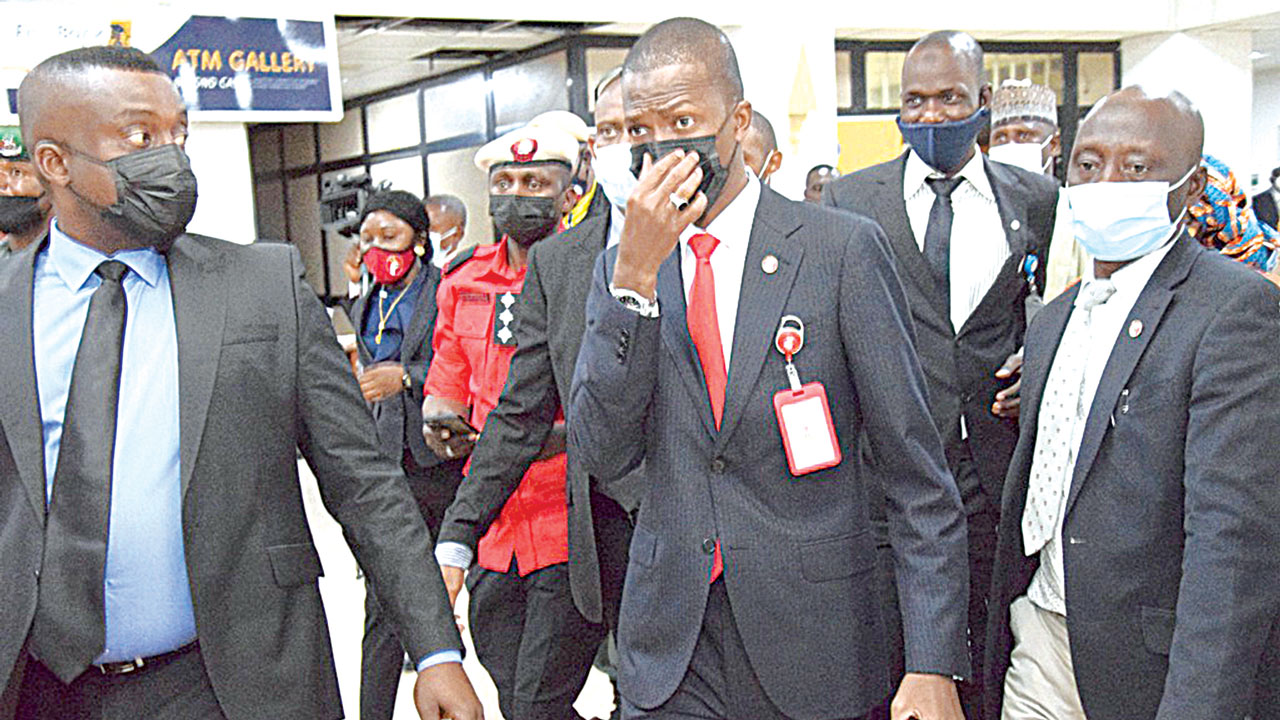Editorial
Kudos, EFCC, But…

During an end-of-year assessment of its operational activities for 2021, the Economic and Financial Crimes Commission (EFCC) promptly declared to Nigerians that it recovered over N152 billion; $386.2 million; £1.1 million; €156,246.76; 1.7 million Saudi Riyal; 1,900.00 South African Rand, and 1,400.00 Canadian dollars between January and December 2021.
A spokesperson for the commission, Wilson Uwujaren, said in a recent statement that the recovery also included a digital currency component with 5,36957319 Bitcoin and 0.09012 Ethereum. The operations by the headquarters dominated the recoveries with N67.2 billion, $375.6 million and £1.1 million, according to the news release.
Uwujaren revealed that the anti-graft agency secured 2,220 convictions across all its commands in 2021 with the Lagos Command recording the most convictions — 481, closely followed by the Ibadan Command with 324 convictions, while the Port Harcourt Zonal Command had 230 convictions. Curiously, the EFCC failed to indicate the cumulative cases in court in the year under review.
The convictions obtained by the commission in 2021 are the highest since its establishment. Prior to 2021, the highest number of convictions was reached in 2019 at 1,280. The record of 2,220 in 2021 is 127.5 per cent better than in 2019. The record 2,220 represents a 98.49 per cent success rate in prosecutions as the commission lost only 34 cases during this period.
We heartily commend the EFCC chairman, Abdulrasheed Bawa, and his staff for their industry and dedication despite the challenges of criminal litigation in the courts. The organisation should keep on motivating all categories of staff for greater efficiency through capacity development and other incentives and ensure that perpetrators of economic and financial crimes are denied the benefits of the proceeds of crime.
As an agency charged with the responsibility of recovering looted assets in Nigeria by arresting and prosecuting offenders, a day hardly passes without the commission inviting jittery and errant politicians and corrupt persons for questioning. It is no longer hearsay that this “eagle” deployed by the Federal Government has gouged many preys and is pursuing others.
Since its inception during former President Olusegun Obasanjo’s administration, the EFCC has had cases against prominent Nigerians, and what often begins as a light grilling sometimes does climax in a jail term, with victims having to part with considerable sums as bail. Some are acquitted following marathon trials that pass through multiple courtrooms.
The Federal Government may have earned credit for recovering stolen funds or property in Nigeria. Its posture is laudable even though the administration is not the right bet considering the tattoos of banditry, insurgency, kidnappings, hunger, insecurity, poverty, and unemployment engraved on the face of the average Nigerian.
Despite the latest figures projecting the EFCC’s achievements, the question on the lips of many Nigerians is: where does the anti-graft agency channel recovered looted funds? In other words, where does the confiscated money reside? In deposit accounts earning interest? Nigerians need to know and maybe see concrete steps that are being taken with these funds.
Although the EFCC had at different times claimed that recovered funds were lodged in a Federal Government’s consolidated account in the Central Bank or deposited in some interest-yielding accounts on the instruction of the courts, revelations unearthed when Bawa appeared before a House of Representatives ad hoc committee investigating the status of recovered loots mainly under its former chairman, Ibrahim Magu, proved otherwise.
Various transactions were flagged by the committee, some of which included unauthorised transfers to and from the EFCC account. The Attorney General, Abubakar Malami, had in a series of letters to the President accused Magu of diverting billions of Naira of recovered funds, as well as failing to act timeously on a presidential directive to investigate the controversial $9.6 billion P&ID British firm that secured a gas contract in Nigeria.
Funds recovered by the EFCC should be accounted for and be used to tackle youth restiveness. As a realistic approach to reducing crime, insecurity and unrest that many Nigerians have grown accustomed to, some of these funds should benefit unemployed graduates. Whatever challenges such an approach may pose, the Federal Government can respond to them in its own way.
It is expedient for Nigerians to be privy to credible information about the recovery of looted assets, identities of the perpetrators or those associated with corruption cases, as well as details of their prosecution and the composite number of cases in court within a review period. This is what we need to know to appreciate the exploits of the anti-graft agency.
Editorial
Sustaining OBALGA’s Ban On Street Trading

Editorial
AFCON ’25: Bravo, Super Eagles, But…

Editorial
Fubara: Celebrating A Leader At 51

-

 Sports2 days ago
Sports2 days agoArsenal Women End Man City’s Invincibility
-

 Sports2 days ago
Sports2 days agoInsurance Deepen Enyimba’s Trouble
-

 Sports2 days ago
Sports2 days agoU-20 WWC: Falconets claim qualifier win
-

 Sports2 days ago
Sports2 days agoYouth Olympics preparation Gears up
-

 Sports2 days ago
Sports2 days agoTornadoes Set For NPFL exit over Stadium Ban
-

 Sports2 days ago
Sports2 days agoCologne Youth Team Set Crowd Record
-

 Environment2 days ago
Environment2 days agoRivers State Government Suspend Fire Service Collection Levies
-

 Environment2 days ago
Environment2 days agoLASEMA pushes attitudinal change to cut fire outbreaks in Lagos

